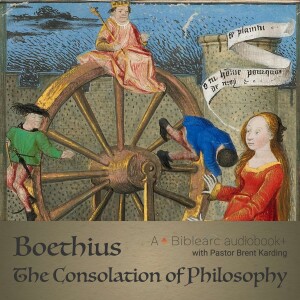
Chapter Summary
Philosophy asserts that human reason cannot attain God’s simple foreknowledge, and for that reason Boethius is confused by the contradiction between foreknowledge and free will. She will now unravel his difficulties, and then help him grasp the simplicity of God’s foreknowledge.
If some events do not occur out of necessity, then the contradiction between foreknowledge and free will is resolved. For example, there are actions that unfold before our eyes that are not compelled by outward necessity, such as skilled chariot-driving. Just as our knowledge does not compel events to happen as we watch them, so God’s perfect knowledge does not compel future events to happen as he watches them.
But can events that by their nature are not certain to occur be foreknown? Yes, because whether an event is necessary or not does not affect God’s foreknowledge of it, since knowledge is based on the nature of the knower, not the nature of the event. Philosophy illustrates this by explaining that Physical Sensation, Imagination, Reason, and Intelligence grasp man’s nature in different ways, Intelligence being the highest of all, with the purest and most perfect insight. The knowledge of man these faculties gain is based on the nature of these faculties, not on the nature of man.
About The Consolation of Philosophy
Written in the 6th-century from a prison cell as the author awaits execution for a crime he did not commit, The Consolation of Philosophy is a dialogue between Boethius and a mysterious woman—Lady Philosophy—who helps him rediscover wisdom and virtue.
Subscribe now and begin walking the path of wisdom with us.
 Want to go deeper?
Want to go deeper?
You’re invited to join the companion course that dives deep into each of the five books. There, we’ll explore each chapter, with guided readings, discussion prompts, and study tools to enrich your journey. Enroll today.
No comments yet. Be the first to say something!